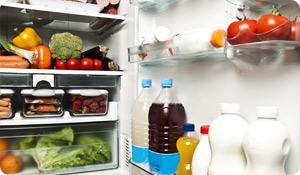
If your kitchen cabinets hold cans dating back to the last century and your freezer is home to unrecognizable lumps of ice-coated leftovers, you may be due for a crash course on food storage. Knowing where and how to store food is tricky. Some produce thrives in the refrigerator, while other types wilt and lose flavor. Some meats maintain their good quality for a year in the freezer, while others should be used within three months. It's enough to produce anxiety on the most seasoned cook.
"Storing food definitely causes confusion for people," says Alissa Ritter, RD, CDN, of New York-Presbyterian/Weill-Cornell Medical Center in New York City.
Here's what you need to know about where and how to store the food you eat:
Canned and Packaged Foods: Store canned and packaged foods in a cool, dark, dry cabinet, advises Keri Gans, RD, author of The Small Change Diet. "And rotate cans so you use up the first ones you bought first," she advises.
Canned and packaged foods often are labeled with a sell-by or use-by date. "Look at the label and follow the recommended dates," Ritter says. "If a can is labeled, 'use by,' you should plan to eat it by then. But if a can says 'sell by,' you have a bit more leeway."
Fresh Produce: As a general rule, moister vegetables such as lettuce, broccoli, cauliflower, and Brussels sprouts should be kept in the refrigerator, Ritter says. Root vegetables such as yams, turnips, and potatoes can be left out of the refrigerator.
Refrigerate all produce that's bought precut or is already peeled, and if you're not sure whether a particular item needs to be stored in the refrigerator, ask the produce manager at the supermarket.
There's certainly no need to go out and buy a lot of fancy washes in order to have clean produce. Instead, wash fruits and vegetables under cold running water, says Gans. "People think they don't need to wash a fruit if it's got a skin, but if you are going to cut through that peel, then you should wash it," Gans says. Don't wash berries until you're ready to use them, since they'll spoil faster after being washed.
Meat and Poultry: Store in the meat compartment of the refrigerator, Gans says, or freeze it. Chicken can be successfully frozen for up to 12 months, while ground meat can be stored for up to three months, Gans says. Steaks, chops, and roasts may be frozen for up to 12 months. Cooked meats and casseroles will last in the freezer for up to three months, according to the USDA. Be sure to put food into clear freezer containers or into freezer-quality plastic bags. Label and date them before you put them into the freezer.
Safe Temperatures: Set your refrigerator at 40 degrees or slightly below and your freezer at 0 degrees. Buy a thermometer for each and check it regularly. Pay attention to where you store foods in the refrigerator; store only condiments and foods that are less perishable in the door.
"Milk and other dairy products should not be stored in the door of the refrigerator," Gans says.





